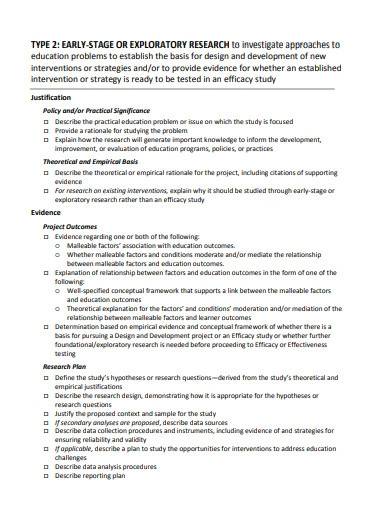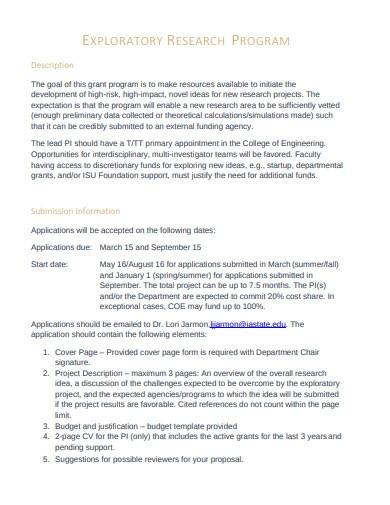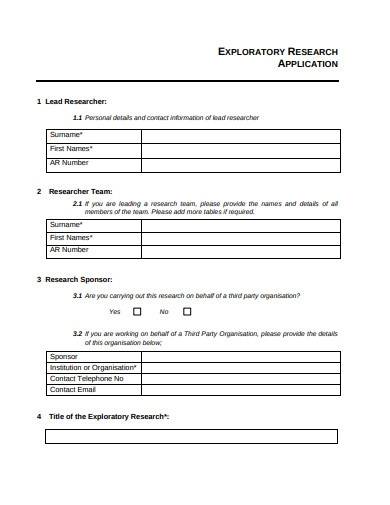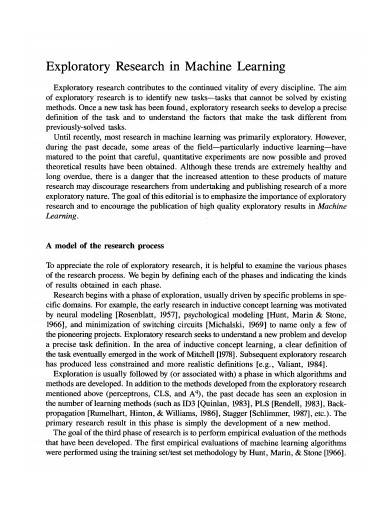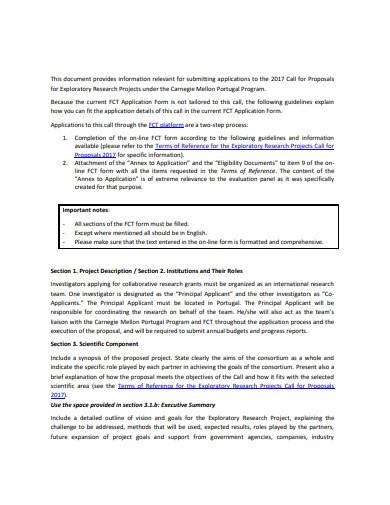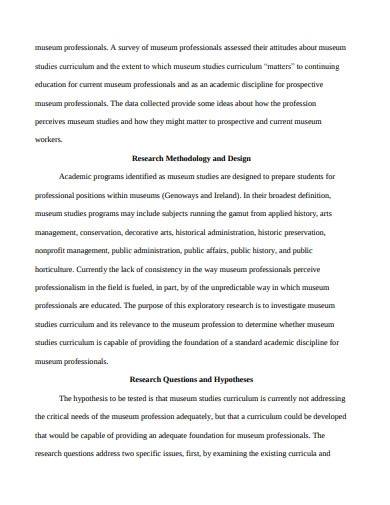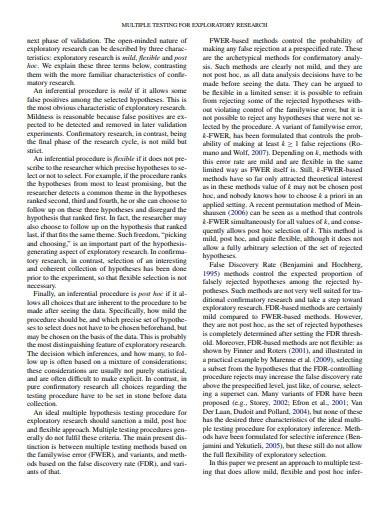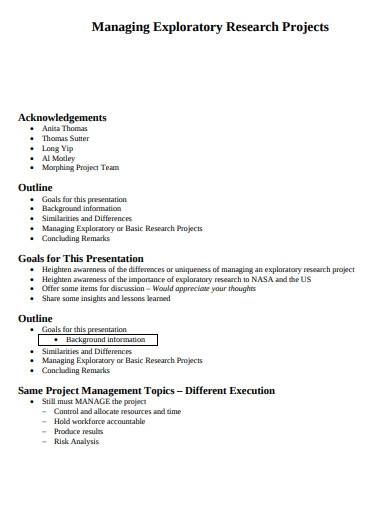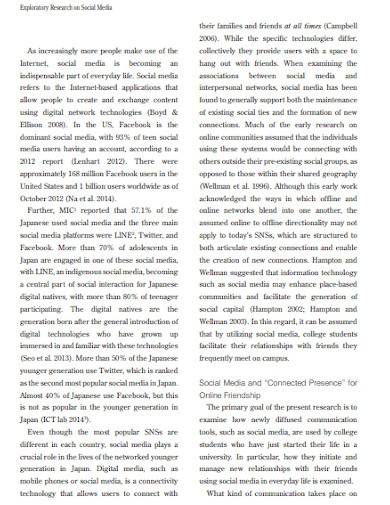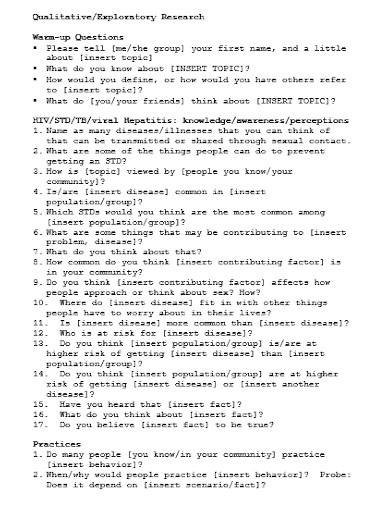Research is a process that requires a continuous improvement plan or development plan in which most researchers continue working on existing theories and proceed with their research from there. However, there are also researchers who chose to work on an issue or problem that was not yet studied to provide priorities, come up with operational definitions, and improve the final research design which is referred to as explanatory research. Other types of research include experimental research, descriptive research, educational research, qualitative research, quantitative research, and more.
FREE 10+ Exploratory Research Samples & Templates in PDF | MS Word
1. Early Stage or Exploratory Research Template
2. Sample Exploratory Research Program
3. Exploratory Research Letter Template
4. Exploratory Research Application Template
5. Exploratory Research in Machine Learning
6. Exploratory Research Project Template
7. Research Methodology and Design Template
8. Multiple Exploratory Research Template
9. Sample Exploratory Research Projects
10. Exploratory Research on Social Media
11. Qualitative/Exploratory Research Template
What is an Exploratory Research?
Exploratory research is a method used to explore research questions that have yet to be studied in depth and have typically qualitative and primary characteristics. This research is also called interpretive research or an approach with grounded theory because of its flexibility and open-ended structure. It is often used when studying a fresh issue or when the process of data collection is found to be complex or challenging.
How to Conduct an Exploratory Research
Exploratory research starts with a general idea and utilizes this research approach to determine the problems which can be the focus of the research in the future. As its name implies, exploratory research only aims to explore a certain research problem or question and is not to be expected to provide final and decisive solutions or answers, however, it helps researchers to better understand the research problem.
Step 1: Determine Your Research Problem
Start by determining the problem or issue of your topic or subject and decide whether exploratory research is the appropriate approach to achieve your objectives. Keep in mind that exploratory research only aims to provide a better understanding or comprehension of a research problem and does not intend to provide conclusive answers.
Step 2: Create a Hypothesis
Think of the possible answers or solutions to the research question or problem you are investigating, then create a hypothetical statement. This statement will serve as your guide during your entire research process.
Step 3: Include a Methodology
Design the data collection and data analysis steps you will be using and write them in your research design. You can use tools for this step such as data collection sheet checklists, data analysis research plans, and research data collection forms.
Step 4: Perform Data Collection and Analysis
You can now proceed to your data collection and analysis procedure to determine if your preliminary results align with your hypothetical statement. In exploratory research, you can change your hypothesis based on your results.
FAQs
How do you differentiate exploratory research from explanatory research?
Exploratory research aims to explore a research question that has yet to be clearly defined and often opens opportunities for future research while explanatory research aims to answer why and how research has been conducted.
What are the advantages of conducting exploratory research?
Exploratory research helps in narrowing down a complex research problem that has yet to be studied and provides guidance for future research that will have new and challenging problems which will be added to the body of your current research. This research is also flexible, affordable, and open-ended.
What are the methodologies of exploratory research?
The methodologies of exploratory research include primary research methods which are the observations, interviews, focus groups, and surveys, and the secondary research methods which are case studies, literature review or research, and online sources.
Exploratory research is a type of research approach that aims to investigate a research problem or question that has yet to be clearly defined, studied, or understood. This type of research does not intend to provide or obtain a conclusive answer or result but to deliver a deeper context or understanding of the research problem which can serve as the basis or groundwork for other types of research in the future.
Related Posts
FREE 6+ Sample Research Analysis Templates in MS Word PDF
FREE 11+ Research Plan Samples in PDF MS Word
FREE 12+ Sample Research Reports in MS Word Apple Pages ...
FREE 8+ Research Monograph Samples in PDF MS Word
FREE 7+ Sample Cover Page for Research Paper Templates in MS ...
FREE 12+ Research Proposal Samples in PDF MS Word | Pages
FREE 7+ Sample Research Reports in PDF
FREE 7+ Sample Research Poster in PDF MS Word
FREE 6+ Sample Research Paper Outline Templates in PDF MS ...
FREE 11+ Sample Research Plan Templates in MS Word PDF
FREE 8+ Market Research Samplesin PDF MS Words | Apple Pages
FREE 7+ Research Agenda Samples in PDF
FREE 5+ Sample Research Paper Templates in PDF
FREE 10+ Sample Research Proposal Templates in MS Word Pages
FREE 12+ Sample Research Proposal Templates in PDF MS Word

